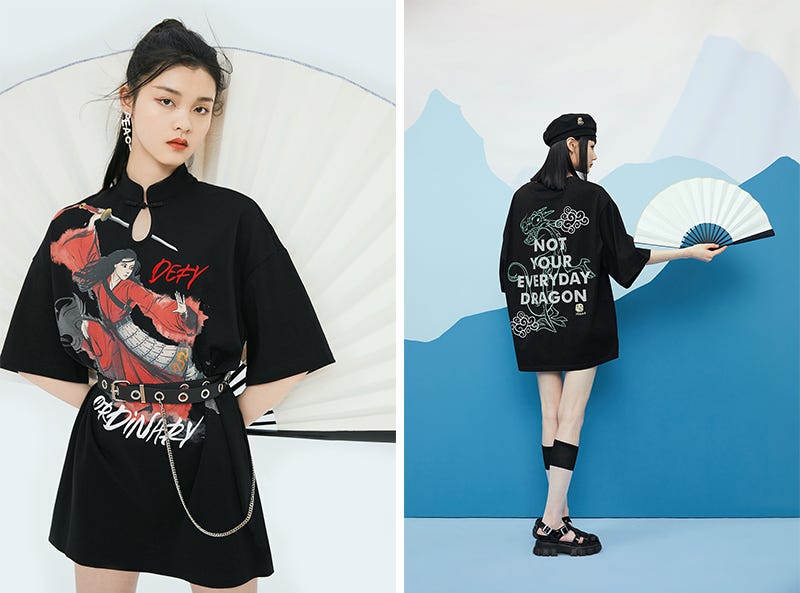Consumerism Finds a New (Digital) Normal for Women's Day
Plus: a movie collaboration sans a debut, marketing "cloud entertainment," and Tmall's brand disco.

While the global economy continues to face worsening fallout from the spread of the coronavirus, a dramatic slowdown in the number of new cases reported in China outside of the Wuhan epicenter means that more offline commercial activity is resuming. Still, e-commerce will continue to play a growing role in consumption habits for some time to come.
The activity around International Women’s Day in China by Tmall — which has rebranded the occasion as “Queen’s Day” — highlights the platform’s multifaceted approach to promoting online sales through content. While brand campaigns for Women’s Day in many Western markets may ring hollow, China has a long tradition of celebrating the March 8 date as a socialist holiday, and its more recent adoption by brands as a shopping event plays into themes of female empowerment and the “she economy.”
Tmall predicted that its 2020 Women’s Day sales would be the biggest yet for the e-commerce giant, with twice as many merchants participating and 60% more products available. In addition, Tmall said it would increase its consumer subsidies by RMB 1 billion ($144 million) to encourage sales, and shared consumer insights with sellers to help them prepare and stock in-demand products such as sandwich-makers and mopping robots.
A celebrity warmup campaign featuring a “Girlfriend Team” (noted in the last issue of our newsletter) kicked things off for Tmall in late February, but that was just the first step of an expansive content strategy.
A men’s “Warm Friend Team” (暖友团) of six celebrities was also created to show support for women, with an associated mobile game to allow app users to win discounts.
Playing into the current trend for “cloud” content that has emerged from the coronavirus outbreak, Tmall produced a short variety series, “Miss, Please Check Out the Gift” (小姐姐礼好请查收), a celebrity show in vlog format to promote Tmall’s Women’s Day gift boxes. Since many of the 300 box sets on offer were joint brand collaborations, the series served to promote a number of brands. On the March 6 episode, for example, singer Jiang Yingrong was seen opening more than ten gift boxes, highlighting brands such as Swarovski, Elizabeth Arden and Sulwhasoo.
A concurrent campaign, “Giving You All the Springtimes Around the World (给你全世界的春天), was launched to promote seasonal goods, with a video that shared views of the season from various countries to promote international products.
Using the theme of “love yourself,” Tmall created a short animated video featuring a number of brands (more on this in our brand film pick below) and invited nine female celebrities to make vlogs promoting the film.
Yet not all brand campaigns were received as warmly. Chanel faced controversy this year after brand ambassador Xin Zhilei posted photos of herself on Weibo with the brand’s perfume bottles and a caption that read, in part, “a woman who doesn’t wear perfume has no future.”
Although that quote has been long attributed to Coco Chanel herself, Xin did not explain its origins and taken out of context, many saw it as insulting and even misogynistic, and called it out as an example of poor copywriting.
Can “Mulan” Fashion Collaborations Succeed Without a Film Release?

The status of many brand collaborations that are tied to indefinitely postponed filmed releases is up in the air, but at least some are going ahead with their IP-related product launches.
Disney placed a big bet on the Chinese market to support its live-action version of “Mulan,” casting the popular actress Liu Yifei in the title role of the $200 million film as part of its effort to appeal to domestic Chinese moviegoers (Liu has since risked alienating overseas audiences through her support of Beijing against Hong Kong’s democracy movement).
With theaters in China still closed, it is highly unlikely that “Mulan” will open in China anytime close to its scheduled global release dates in late March (and even those dates are facing challenges as the coronavirus spreads in more countries).
Domestic fast-fashion brand Peacebird went ahead with the launch of its “Mulan” collection on March 5, just in time for Women’s Day. The line of streetwear-inspired designs aimed to “capture the spirit of Mulan” and blend Eastern and Western elements in a modern take on traditional Chinese fashion. The collection has drawn a great deal of attention on social media, with its hashtag (#太平鸟花木兰合作系列#) drawing nearly 40.5 million views so far with a campaign that tied the themes of female independence of the Mulan story to empowerment for Women’s Day. The emerging Chinese label has been a frequent collaborator with established IP names in the past, such as Tom and Jerry, Playboy, and Coca-Cola.
Another domestic brand sharing the “Mulan” aesthetic is One More, which has a more traditionally oriented collection that includes ancient hanfu-style outfits, showing how a look once considered to be part of a subcultural niche has gone mainstream amid growing interest from Gen Z and millennial consumers in China’s deep cultural heritage.
And although there is no “Mulan” release date in the foreseeable future, Disney offered China a related “gift” for Women’s Day with the release of a new Chinese recording of “Reflection,” one of the best-known songs from the 1998 animated version, performed by none other than Liu Yifei.
Branding Cloud Entertainment

The recent trend for entertainment content to go into the cloud has brought about a slew of casual-looking productions streamed from the homes of their stars, often sharing their daily lives under the coronavirus lockdown along with music, cooking and other activities. However, the rapid turnaround time in bringing new programming online to keep audiences engaged has, in many cases, left brands out in the cold.
Of the 15 new reality shows that premiered in February, only seven had brand sponsors, and the situation was especially grim for online shows, with only two out of nine featuring brand involvement.
One notable exception is Hunan TV’s “cloud” edition of its popular talk show “Day Day Up” (天天向上). Perhaps thanks to its connections to an existing format, “Day Day Cloud Time” (天天云时间) has been able to secure an impressive eight brand sponsors. Baidu’s smart speaker brand Xiaodu is the title sponsor, fitting well into the content that often focuses on how the celebrity host spend their time at home. For example, when a guest mentioned that he was having trouble helping his son with his studies now that schools are closed, the host recommended using Xiaodu as an educational aid and demonstrated its use in that capacity.
However, the longer-term outlook remains uncertain, as advertisers reduce their investment in content as they face a broader economic downturn. Although 14 television networks and streaming platforms have jumped onto the cloud reality show bandwagon so far, the ongoing sustainability of the format could suffer if brands continue to take a wait-and-see approach and the novelty of watching celebrities at home wears off among viewers.
Colmo’s Bauhaus Series

Appliance maker Midea’s premium Colmo brand has teamed up with cultural programming platform Vistopia to present a two-part documentary series on the Bauhaus movement with two noted cultural figures serving as guides to the evolution of design.
The first part features Hong Kong writer and critic Leung Man-tao (who is also a founder of Vistopia) introducing Bauhaus architecture and design on location in Germany, while the second part sees Leung in conversation with Chinese-American artist and writer Chen Daqing. The series is also available on Tencent Video’s art channel.
Brand Film Pick: Tmall’s Brand Disco
As part of its wide-ranging Women’s Day promotional activity, Tmall created a short animated music video, “Love Supply Station” (爱的补己站), with a catchy and repetitive tune that seems inspired by the simple retro vibe of last year’s viral hit “Wolf Disco.”
The video stars Tmall’s cat head mascot dancing alongside eight brand partners — among them are YSL cosmetics, Ferrero chocolate and Panasonic electric toothbrushes — and each is noted in the lyrics in a humorous manner. For example, YSL’s lipstick has the line, “Thinking of giving you a kiss, and I blushed.”
The rest of the song repeats Tmall’s endless love for its customers while encouraging them to love themselves as well (and to show it by splurging on themselves a bit more, perhaps).
News in English
A review of WeChat’s new short-video feature, how it stacks up to competitors Douyin and Kuaishou, plus what key influencers think of it. WalktheChat
Dior and Chanel are emerging as winners of the luxury fashion show livestreaming game, with all-out campaigns that drew millions of Chinese viewers to watch their recent Paris shows. WWD
And does the coronavirus spell the end of fashion shows as we know them? New York Times
“Cloud beauty advisers” are trending as the industry’s service workers go online to sell products. Sixth Tone
From body wash to dried tofu, what Chinese shoppers have been buying online since the coronavirus outbreak started. Coresight Research
How China’s ambitious DTC beauty brands combine e-commerce livestreaming, a variety of influencers and strong content to establish their presence across platforms in ways that are more adventurous than Western brands. Business of Fashion
Creative agency leaders share how they are adapting to work under the impact of the coronavirus. SHPPLUS
We’ve Got China Covered
China Film Insider: CFI Q&A: Filmmaker Emily Ting on “Go Back to China”
Jing Daily: The Post-Covid-19 Rise of Conscious Luxury
Jing Travel: The Jing Travel WeChat Index: Feb 2020
Thank you for subscribing and for reading — please keep the feedback coming, and if you enjoy what we’re doing, we greatly appreciate you sharing with a friend or colleague. We’ll be back Thursday with more news and case studies.


